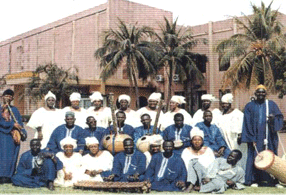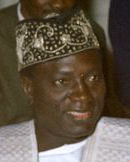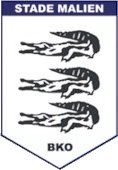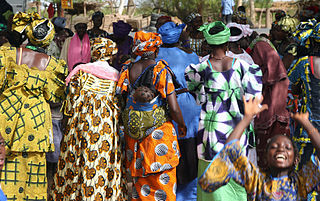Related Research Articles

Mali, officially the Republic of Mali, is a landlocked country in West Africa. Mali is the eighth-largest country in Africa, with an area of over 1,240,000 square kilometres (480,000 sq mi). The population of Mali is 19.1 million. 67% of its population was estimated to be under the age of 25 in 2017. Its capital and largest city is Bamako. The sovereign state of Mali consists of eight regions and its borders on the north reach deep into the middle of the Sahara Desert. The country's southern part is in the Sudanian savanna, where the majority of inhabitants live, and both the Niger and Senegal rivers pass through. The country's economy centres on agriculture and mining. One of Mali's most prominent natural resources is gold, and the country is the third largest producer of gold on the African continent. It also exports salt.

Mali's transportation infrastructure is regarded as poor, even by regional standards, and deficiencies have limited economic growth and development. Nevertheless, improvements have been noted in the early 2000s. Most of the transportation in Mali consists of cars, planes, and boats.

The Music of Mali is, like that of most African nations, ethnically diverse, but one influence predominates; that of the ancient Mali Empire of the Mandinka. Mande people make up 50% of the country's population, other ethnic groups include the Fula (17%), Gur-speakers 12%, Songhai people (6%), Tuareg and Moors (10%) and another 5%, including Europeans. Mali is divided into eight regions; Gao, Kayes, Koulikoro, Mopti, Ségou, Sikasso, Tombouctou and Bamako.

Salif Keïta is an African singer-songwriter from Mali. He is notable not only because of his reputation as the "Golden Voice of Africa" but also because he has albinism. He is a member of the Keita royal family of Mali.

Modibo Keïta was the first President of Mali (1960–1968) and the Prime Minister of the Mali Federation. He espoused a form of African socialism.
The Rail Band is a Malian band formed in 1970; it was later known as Super Rail Band, Bamako Rail Band or, most comprehensively and formally, Super Rail Band of the Buffet Hotel de la Gare, Bamako. Its fame was built upon the mid-20th century craze for Latin — especially Cuban — jazz music which came out of Congo in the 1940s. The Rail Band was one of the first West African acts to combine this mature Afro-Latin sound with traditional instruments and styles. In their case, this was built upon the Mande Griot praise singer tradition, along with Bambara and other Malian and Guinean musical traditions. Their distinctive sound came from combining electric guitar and jazz horns with soaring Mandinka and Bamabara lyrical lines, African and western drums, and local instruments such as the kora and the balafon. At their height of fame in the 1970s, the Rail Band played to sold-out venues and even stadia across West Africa, and launched solo careers for many of its members, including the legendary vocalist Salif Keita.

Toumani Diabaté is a Malian kora player. In addition to performing the traditional music of Mali, he has also been involved in cross-cultural collaborations with flamenco, blues, jazz, and other international styles.

Massa Makan Diabaté was a Malian historian, author, and playwright.
Djelimady Tounkara is a Malian musician and one of the foremost guitarists in Africa.

Habib Koité is a Malian musician, singer, songwriter and griot based in Mali. His band, Bamada, was a supergroup of West African musicians, which included Kélétigui Diabaté on balafon.

Stade Malien is a Malian professional football and sports club based in Bamako. One of the two dominant clubs of Malian football, their eastern Bamako training grounds host other sports as well, including a successful basketball club.

In the Heart of the Moon is a 2005 record by Malian musicians Ali Farka Touré on the guitar and providing vocals and Toumani Diabaté on the kora. The album was recorded in the "Toit de Bamako" conference room on the top floor of the Hotel Mandé overlooking the Niger River in Bamako, Mali. It is the first in a three-part series released on World Circuit Records entitled "The Hotel Mandé Sessions" followed by Savane and Boulevard de l'Independence. The album's title is derived from Touré's own more lengthy descriptive title for the recording session; "A very important meeting in the realm at the heart of the moon."
Balla Moussa Keïta was a Malian actor and comedian, and a West African cinema pioneer who was well known in the West. Born in the Ségou Region of Mali as a traditional prince of the Keita dynasty, he was originally a radio producer. He later turned to acting and acted in a number of movies by notable Mali directors like Cheick Oumar Sissoko, Souleymane Cissé and Abdoulaye Ascofaré. Among his critically acclaimed roles are those of the tribal king Rouma Boll in Yeelen and as Mambi in Guimba, un tyrant, une époque. He received the Best Male Interpretation award at the FESPACO for his role in the Guinean film Séré, le témoin.
Drissa Kone is a djembe master drummer from Mali.

The Office of Radio and Television of Mali is the national broadcaster of the West African state of Mali.
Rainer Polak is an ethnomusicologist and djembe drummer who has researched in the field of West African celebration music performances and written in the field of ethnomusicology.

The culture of Mali derives from the shared experience, as a colonial and post-colonial polity, and the interaction of the numerous cultures which make up the Malian people. What is today the nation of Mali was united first in the medieval period as the Mali Empire. While the current state does not include areas in the southwest, and is expanded far to the east and northeast, the dominant roles of the Mandé peoples is shared by the modern Mali, and the empire from which its name originates from.

In Mali, football is played widely and followed avidly, football is the most popular sport in Mali. Large professional clubs and international competition draw much popular attention, and the sport is played as a pastime.
Mamadou Sidiki Diabaté is a prominent Mandé kora player and jeli from Bamako, Mali. He is the 71st generation of kora players in his family and a son to Sidiki Diabaté.
Mali
References
- ↑ : notes on "The Mali Tradition Vol. 1" CD edition.